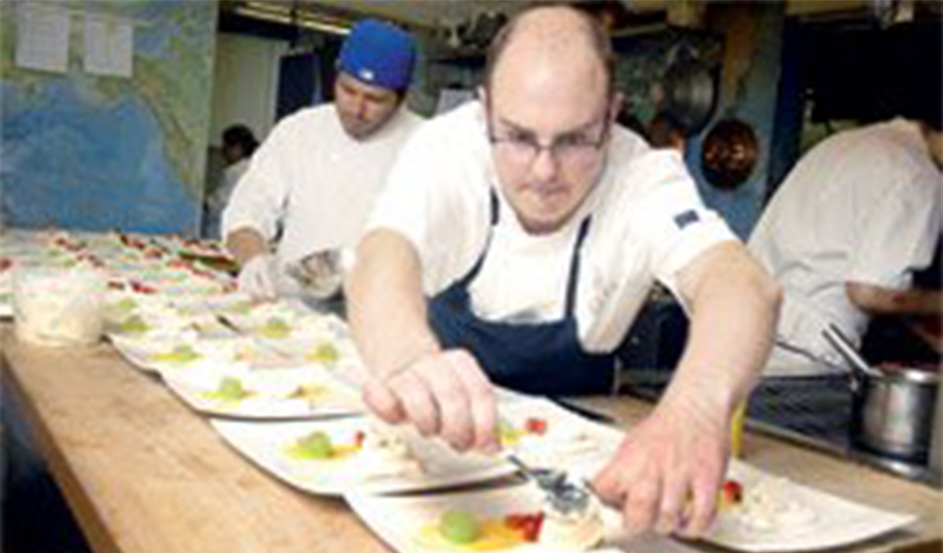
GO WITH THE FLOW
Most chefs would find it difficult to agree with a ‘go with the flow’ mentality in the kitchen, as professional kitchens require an organised, structured and well coordinated effort by everyone involved to ensure a smooth service. However there is a type of flow that we may be missing in the kitchen.
Daniel Goleman, author of; Emotional Intelligence (Bloomsbury, 1996) talks about “flow: the neurobiology of excellence”. Flow is a term coined by University of Chicago psychologist Mihaly Csikszentmihalyi to describe the mental state entered when emotions are harnessed to their peak in the service of performance and learning.
The following are excerpts from the book which outline the concept:
“Athletes know this state of grace as ‘the zone’, where excellence becomes effortless, crowd and competitors disappearing into a blissful, steady absorption in the moment… remarkably similar to hundreds of men and women – rock climbers, chess champions, surgeons, basketball players, engineers, managers and even filing clerks – when they talk of a time they outdid themselves in some favoured activity”.
“In flow the emotions are not just contained and channelled, but positive, energized, and aligned with the task at hand”.
“Flow is an experience almost everyone enters from time to time, particularly when performing at their peak or stretching beyond their former limits”.
“Because flow feels so good, it is intrinsically rewarding. It is a state in which people become utterly absorbed in what they are doing, paying undivided attention to their task, their awareness merged with their actions”.
“Flow is a state of self forgetfulness, the opposite of rumination and worry: instead of being lost in nervous preoccupation, people in flow are so absorbed in the task at hand that they lose all self consciousness, dropping the small preoccupations”.
“People seem to concentrate best when the demands on them are a bit greater than usual. If there is too little demand on them, people are bored. If there is too much for them to handle they get anxious. Flow occurs in the delicate zone between boredom and anxiety”.
Flow is therefore a state conducive to producing excellent results, and it would seem that its origins lie in a natural affinity and passion for the task at hand. So why is there such little flow in our kitchens when passion is supposed to be a chef’s main driving force?
Passion does result in great food, broken down into a logical pattern of thought; the more passionate you feel towards your work the more attention to detail, perseverance and dedication you will have at every step along the way.
It is common to hear athletes talk about ‘entering the zone’, a state of mind they intentionally enter to achieve superlative results. Chef’s too should be able to enter such a state of controlled calm, in which they are confident of their skills and knowledge required to take on the task at hand.
The task is to create kitchens conducive to chefs entering this state of mind, aiding them in attaining ‘flow’ in the kitchen will inevitably result in better food and a smoother service. The following are suggestions which directly or indirectly affect issues such as confidence, skill level, knowledge, state of mind etc. all of which are vital for flow.
- To achieve ‘flow’ one must be pushed to their comfortable limits and then challenged to a point which is enjoyable rather than nerve provoking. Therefore as a head chef you can identify each individual’s skill level and aptitude within the kitchen, to aid in developing more strategically sound decisions on what duties to assign each member of your team. In doing so you will also learn their weaknesses which can be worked on once identified.
- Setting a menu which takes practicality of execution into consideration. During new menu trials and tasting sessions, the finishing, style, presentation and fine details are sometimes set at a standard which is only attainable under those ‘menu tasting’ conditions. It is often easy for head chefs to over look the practicality of executing the dish during a full service, whether it be the skill level required by the chefs or the equipment/ space available to them during service. The menu should be set at a level which challenges the chefs, yet is practical enough that it can be executed to the highest levels possible during a full service.
- Encouraging a united ‘flow’ state of mind during service. Coach staff in to a united flow through the use of pep-talks and leading by example. Encourage awareness to detail and mental focus, chefs should enjoy and take pride in the fruits of their labour. Being vocal about this and developing it as part of the kitchen’s ethos and culture will ultimately result in a greater passion for the food.

